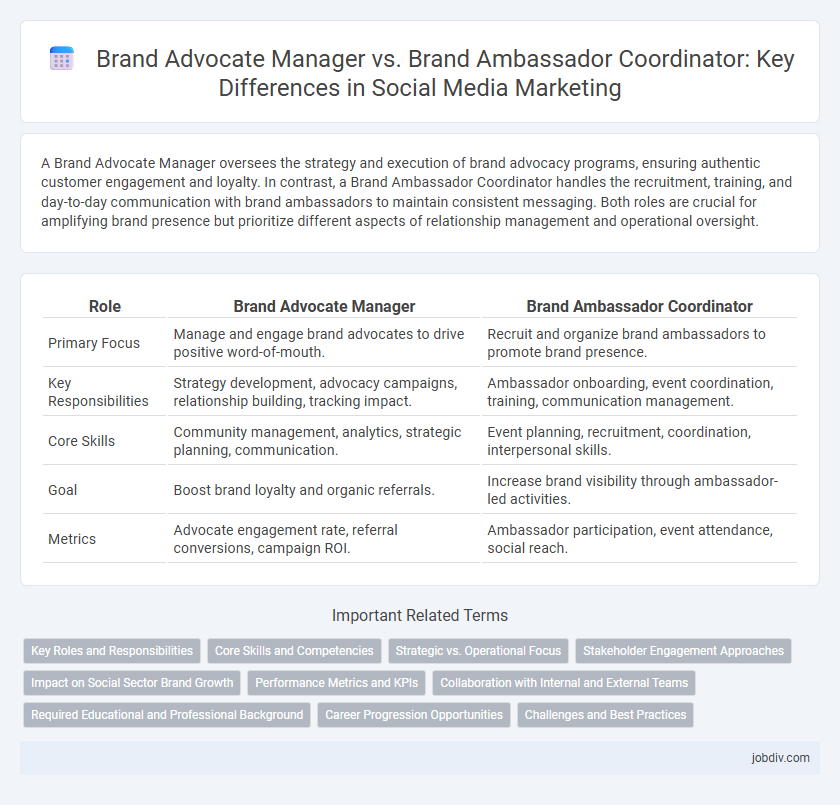A Brand Advocate Manager oversees the strategy and execution of brand advocacy programs, ensuring authentic customer engagement and loyalty. In contrast, a Brand Ambassador Coordinator handles the recruitment, training, and day-to-day communication with brand ambassadors to maintain consistent messaging. Both roles are crucial for amplifying brand presence but prioritize different aspects of relationship management and operational oversight.
Table of Comparison
| Role | Brand Advocate Manager | Brand Ambassador Coordinator |
|---|---|---|
| Primary Focus | Manage and engage brand advocates to drive positive word-of-mouth. | Recruit and organize brand ambassadors to promote brand presence. |
| Key Responsibilities | Strategy development, advocacy campaigns, relationship building, tracking impact. | Ambassador onboarding, event coordination, training, communication management. |
| Core Skills | Community management, analytics, strategic planning, communication. | Event planning, recruitment, coordination, interpersonal skills. |
| Goal | Boost brand loyalty and organic referrals. | Increase brand visibility through ambassador-led activities. |
| Metrics | Advocate engagement rate, referral conversions, campaign ROI. | Ambassador participation, event attendance, social reach. |
Key Roles and Responsibilities
A Brand Advocate Manager oversees the development and execution of strategies to engage loyal customers and amplify positive brand experiences through targeted campaigns, data analysis, and relationship management. A Brand Ambassador Coordinator primarily focuses on recruiting, training, and managing brand ambassadors to ensure consistent brand representation at events and on social media platforms. Both roles require strong communication skills, but the manager emphasizes strategic planning while the coordinator prioritizes operational execution and ambassador support.
Core Skills and Competencies
Brand Advocate Managers excel in strategic communication, relationship building, and data-driven campaign analysis, aligning brand messaging with customer insights to enhance advocacy programs. Brand Ambassador Coordinators specialize in event coordination, team leadership, and on-ground brand activation, ensuring seamless execution of ambassador initiatives and real-time feedback collection. Both roles demand strong interpersonal skills and marketing acumen, but Brand Advocate Managers focus more on analytics and strategy, while Brand Ambassador Coordinators prioritize operational management and engagement.
Strategic vs. Operational Focus
A Brand Advocate Manager drives strategic initiatives by developing long-term advocacy programs, analyzing brand engagement metrics, and aligning advocacy goals with overall marketing objectives. In contrast, a Brand Ambassador Coordinator focuses on operational tasks such as recruiting ambassadors, scheduling campaigns, and managing day-to-day ambassador activities. The Manager's role prioritizes strategic planning and measurement, while the Coordinator ensures tactical execution and ambassador program logistics.
Stakeholder Engagement Approaches
Brand Advocate Managers focus on cultivating deep, strategic relationships with key stakeholders to mobilize brand loyalty and amplify word-of-mouth promotions through targeted advocacy programs. Brand Ambassador Coordinators emphasize operational management, organizing ambassador activities and facilitating direct interactions between the brand and its broader community to maintain consistent engagement. Both roles leverage personalized communication tactics but differ in scale, with Managers driving high-impact collaborations and Coordinators ensuring day-to-day brand visibility.
Impact on Social Sector Brand Growth
Brand Advocate Managers strategically cultivate authentic customer relationships to amplify brand loyalty and drive organic social engagement, significantly enhancing brand visibility in the social sector. Brand Ambassador Coordinators oversee recruitment and training of ambassadors, ensuring consistent brand messaging and expanding outreach through personally connected networks. The combined efforts of both roles accelerate social sector brand growth by leveraging genuine community influence and structured ambassador programs.
Performance Metrics and KPIs
Brand Advocate Managers drive measurable growth through performance metrics such as Net Promoter Score (NPS), customer lifetime value (CLV), and advocacy conversion rates, emphasizing strategic engagement and loyalty signals. Brand Ambassador Coordinators focus on KPIs like ambassador activation rates, event attendance, and social media reach, prioritizing the operational execution of ambassador programs and real-time campaign impact. Both roles optimize brand visibility and customer connection but differ in their approach to monitoring and scaling advocacy effectiveness.
Collaboration with Internal and External Teams
Brand Advocate Managers lead strategic collaboration across marketing, sales, and product teams to amplify brand messaging, ensuring alignment between internal stakeholders and external partners. Brand Ambassador Coordinators handle day-to-day coordination with external ambassadors and internal teams, facilitating seamless communication and campaign execution. Both roles require strong interpersonal skills to synchronize efforts, but Advocate Managers focus on high-level strategy while Coordinators manage operational details.
Required Educational and Professional Background
A Brand Advocate Manager typically requires a bachelor's degree in marketing, communications, or business, along with several years of experience in brand management or customer engagement roles. In contrast, a Brand Ambassador Coordinator often needs a background in public relations, event management, or marketing, with a focus on coordinating teams and campaigns, and may not require as many years of experience. Both roles demand strong interpersonal skills, but the Brand Advocate Manager usually holds more strategic responsibility and prefers candidates with a proven professional track record.
Career Progression Opportunities
Brand Advocate Managers typically oversee the development and execution of brand advocacy programs, providing strategic leadership that can lead to senior marketing roles such as Brand Director or Chief Marketing Officer. Brand Ambassador Coordinators focus on managing ambassador relationships and campaign logistics, which offers career growth into roles like Community Manager or Event Marketing Specialist. Progressing from coordinator to manager positions usually involves gaining expertise in leadership, strategic planning, and data analysis within brand marketing.
Challenges and Best Practices
Brand Advocate Managers face challenges in aligning diverse advocate motivations with brand goals while measuring campaign ROI, necessitating data-driven engagement strategies and personalized communication to maximize advocacy impact. Brand Ambassador Coordinators often struggle with recruiting and training ambassadors to ensure consistent brand messaging, requiring scalable onboarding processes and continuous performance monitoring. Best practices include leveraging analytics for targeted support, fostering authentic community relationships, and implementing feedback loops to adapt strategy dynamically.
Brand Advocate Manager vs Brand Ambassador Coordinator Infographic

 jobdiv.com
jobdiv.com